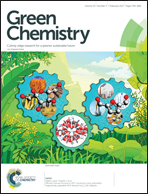NHC-based coordination polymers as solid molecular catalysts for reductive amination of biomass levulinic acid†
Abstract
A class of robust solid molecular NHC-based catalysts were readily fabricated via self-assembly from a p-phenylene-bridged bis-benzimidazolium salt with selected metal precursors. Among them, the NHC-Ru polymer demonstrated high catalytic activity and excellent stability as a solid molecular catalyst for the solvent-free reductive amination of biomass levulinic acid with inexpensive ammonium formate, furnishing a challenging unprotected 5-methyl-2-pyrrolidone quantitatively at a 0.15 mol% catalyst loading. The solid catalyst was readily recovered and reused for 37 runs without obvious loss of activity. Remarkably, a TON value up to 6.7 × 104 was achieved in a molar-scale reaction with a catalyst loading at 0.001 mol%. Inspired by the results of a preliminary mechanistic study, notably, one-pot tandem reductive reactions of LA with aldehydes or ketones were successfully developed, affording a variety of structurally intriguing and functional N-substituted 5-methyl-2-pyrrolidones in high chemo-selectivity with good to excellent yields.


 Please wait while we load your content...
Please wait while we load your content...